- Home
- Anthony Doerr
Shell Collector Page 5
Shell Collector Read online
Page 5
Hush, he whispered. He shook his head no. You have to speak quietly.
Just for a minute.
No, he hissed. You’re crazy. He tugged at her arm. She removed the mitten from her other hand with her teeth and reached down. He pulled at her again but lost his footing and fell back, clutching an empty mitten. As he watched, horrified, she turned and placed both hands, spread-fingered, in the thick shag of the bear’s chest. Then she lowered her face, as if drinking from the snowy hollow, and pressed her lips to the bear’s chest. Her entire head was inside the tree. She felt the soft, silver tips of its fur brush her cheeks. Against her nose one huge rib flexed slightly. She heard the lungs fill and then empty. She heard blood slug through veins.
Want to know what he dreams? she asked. Her voice echoed up through the tree and poured from the shorn ends of its hollowed branches. The hunter took his knife from his coat. Summer, her voice echoed. Blackberries. Trout. Dredging his flanks across river pebbles.
I’d have liked, she said later, back in the cabin as he built up the fire, to crawl all the way down there with him. Get into his arms. I’d grab him by the ears and kiss him on the eyes.
The hunter watched the fire, the flames cutting and sawing, each log a burning bridge. Three years he had waited for this. Three years he had dreamed this girl by his fire. But somehow it had ended up different from what he had imagined; he had thought it would be like a hunt—like waiting hours beside a wallow with his rifle barrel on his pack to see the huge antlered head of a bull elk loom up against the sky, to hear the whole herd behind him inhale, then scatter down the hill. If you had your opening you shot and walked the animal down and that was it. All the uncertainty was over. But this felt different, as if he had no choices to make, no control over any bullet he might let fly or hold back. It was exactly as if he was still three years younger, stopped outside the Central Christian Church and driven against a low window by the wind or some other, greater force.
Stay with me, he whispered to her, to the fire. Stay the winter.
Bruce Maples stood beside him jabbing the ice in his drink with his straw.
I’m in athletics, Bruce offered. I run the athletic department here.
You mentioned that.
Did I? I don’t remember. I used to coach track. Hurdles.
Hurdles, the hunter repeated.
You bet.
The hunter studied him. What was Bruce Maples doing here? What strange curiosities and fears drove him, drove any of these people filing now through the front door, dressed in their dark suits and black gowns? He watched the thin, stricken man, President O’Brien, as he stood in the corner of the parlor. Every few minutes a couple of guests made their way to him and took O’Brien’s hands in their own.
You probably know, the hunter told Maples, that wolves are hurdlers. Sometimes the people who track them will come to a snag and the prints will disappear. As if the entire pack just leaped into a tree and vanished. Eventually they’ll find the tracks again, thirty or forty feet away. People used to think it was magic—flying wolves. But all they did was jump. One great coordinated leap.
Bruce was looking around the room. Huh, he said. I wouldn’t know about that.
She stayed. The first time they made love, she shouted so loudly that coyotes climbed onto the roof and howled down the chimney. Her rolled off her, sweating. The coyotes coughed and chuckled all night, like children chattering in the yard, and he had nightmares. Last night you had three dreams and you dreamed you were a wolf each time, she whispered. You were mad with hunger and running under the moon.
Had he dreamed that? He couldn’t remember. Maybe he talked in his sleep.
In December it never got warmer than fifteen below. The river froze—something he’d never seen. Christmas Eve he drove all the way to Helena to buy her figure skates. In the morning they wrapped themselves head to toe in furs and went out to skate the river. She held him by the hips and they glided through the blue dawn, skating hard up the frozen coils and shoals, beneath the leafless alders and cottonwoods, only the bare tips of creek willow showing above the snow. Ahead of them vast white stretches of river faded on into darkness. An owl hunkered on a branch and watched them with its huge eyes. Merry Christmas, Owl! she shouted into the cold. It spread its huge wings, dropped from the branch and disappeared into the forest.
In a wind-polished bend they came upon a dead heron, frozen by its ankles into the ice. It had tried to hack itself out, hammering with its beak first at the ice entombing its feet and then at its own thin and scaly legs. When it finally died, it died upright, wings folded back, beak parted in some final, desperate cry, legs rooted like twin reeds in the ice.
She fell to her knees and knelt before the bird. Its eye was frozen and cloudy. It’s dead, the hunter said, gently. Come on. You’ll freeze too.
No, she said. She slipped off her mitten and closed the heron’s beak in her fist. Almost immediately her eyes rolled back in her head. Oh wow, she moaned. I can feel her. She stayed like that for whole minutes, the hunter standing over her, feeling the cold come up his legs, afraid to touch her as she knelt before the bird. Her hand turned white and then blue in the wind.
Finally she stood. We have to bury it, she said. He chopped the bird out with his skate and buried it in a drift.
That night she lay stiff and would not sleep. It was just a bird, he said, unsure of what was bothering her but bothered by it himself. We can’t do anything for a dead bird. It was good that we buried it, but tomorrow something will find it and dig it out.
She turned to him. Her eyes were wide; he remembered how they had looked when she put her hands on the bear. When I touched her, she said, I saw where she went.
What?
I saw where she went when she died. She was on the shore of a lake with other herons, a hundred others, all facing the same direction, and they were wading among stones. It was dawn and they watched the sun come up over the trees on the other side of the lake. I saw it as clearly as if I was there.
He rolled onto his back and watched shadows shift across the ceiling. Winter is getting to you, he said. In the morning he resolved to make sure she went out every day. It was something he’d long believed: go out every day in winter or your mind will slip. Every winter the paper was full of stories about ranchers’ wives, snowed in and crazed with cabin fever, who had dispatched their husbands with cleavers or awls.
The next night he drove her all the way north to Sweetgrass, on the Canadian border, to see the northern lights. Great sheets of violet, amber and pale green rose from the distances. Shapes like the head of a falcon, a scarf and a wing rippled above the mountains. They sat in the truck cab, the heater blowing on their knees. Behind the aurora the Milky Way burned.
That one’s a hawk! she exclaimed.
Auroras, he explained, occur because of Earth’s magnetic field. A wind blows all the way from the sun and gusts past the earth, moving charged particles around. That’s what we see. The yellow-green stuff is oxygen. The red and purple at the bottom there is nitrogen.
No, she said, shaking her head. The red one’s a hawk. See his beak? See his wings?
Winter threw itself at the cabin. He took her out every day. He showed her a thousand ladybugs hibernating in an orange ball hung in a riverbank hollow; a pair of dormant frogs buried in frozen mud, their blood crystallized until spring. He pried a globe of honeybees from its hive, slow-buzzing, stunned from the sudden exposure, each bee shimmying for warmth. When he placed the globe in her hands she fainted, her eyes rolled back. Lying there she saw all their dreams at once, the winter reveries of scores of worker bees, each one fiercely vivid: bright trails through thorns to a clutch of wild roses, honey tidily brimming a hundred combs.
With each day she learned more about what she could do. She felt a foreign and keen sensitivity bubbling in her blood, as though a seed planted long ago was just now sprouting. The larger the animal, the more powerfully it could shake her. The recently dead were virtual mine
s of visions, casting them off with a slow-fading strength like a long series of tethers being cut, one by one. She pulled off her mittens and touched everything she could: bats, salamanders, a cardinal chick tumbled from its nest, still warm. Ten hibernating garter snakes coiled beneath a rock, eyelids sealed, tongues stilled. Each time she touched some frozen insect, some slumbering amphibian, anything just dead, her eyes rolled back and its visions, its heaven, went shivering through her body.
Their first winter passed like that. When he looked out the cabin window he saw wolf tracks crossing the river, owls hunting from the trees, six feet of snow like a quilt ready to be thrown off. She saw burrowed dreamers nestled under the roots against the long twilight, their dreams rippling into the sky like auroras.
With love still lodged in his heart like a splinter, he married her in the first muds of spring.
Bruce Maples gasped when the hunter’s wife finally arrived. She moved through the door like a show horse, demure in the way she kept her eyes down but assured in her step; she brought each tapered heel down and struck it against the granite. The hunter had not seen his wife for twenty years, and she had changed— become refined, less wild, and somehow, to the hunter, worse for it. Her face had wrinkled around the eyes, and she moved as if avoiding contact with anything near her, as if the hall table or closet door might suddenly lunge forward to snatch at her lapels. She wore no jewelry, no wedding ring, only a plain black suit, double-breasted.
She found her name tag on the table and pinned it to her lapel. Everyone in the reception room looked at her then looked away. The hunter realized that she, not President O’Brien, was the guest of honor. In a sense they were courting her. This was their way, the chancellor’s way—a silent bartender, tuxedoed coat girls, big icy drinks. Give her pie, the hunter thought. Rhubarb pie. Show her a sleeping grizzly.
They sat for dinner at a narrow and very long table, fifteen or so high-backed chairs down each side and one at each head. The hunter was seated several places away from his wife. She looked over at him finally, a look of recognition, of warmth, and then looked away again. He must have seemed old to her—he must always have seemed old to her. She did not look at him again.
The kitchen staff, in starched whites, brought onion soup, scampi, poached salmon. Around the hunter guests spoke in half whispers about people he did not know. He kept his eyes on the windows and the blowing snow beyond.
The river thawed and drove huge saucers of ice toward the Missouri. The sound of water running, of release, of melting, clucked and purled through the open windows of the cabin. The hunter felt that old stirring, that quickening in his soul, and he would rise in the wide pink dawns, take his fly rod and hurry down to the river. Already trout were rising through the chill brown water to take the first insects of spring. Soon the telephone in the cabin was ringing with calls from clients, and his guiding season was on.
Occasionally a client wanted a lion or a trip with dogs for birds, but late spring and summer were for trout. He was out every morning before dawn, driving with a thermos of coffee to pick up a lawyer, a widower, a politician with a penchant for native cutthroat. After dropping off clients he’d hustle back out to scout for the next trip. He scouted until dark and sometimes after, kneeling in willows by the river and waiting for a trout to rise. He came home stinking of fish gut and woke her with his eager stories, cutthroat trout leaping fifteen-foot cataracts, a stubborn rainbow wedged under a snag.
By June she was bored and lonely. She wandered through the woods, but never very far. The summer woods were dense and busy, nothing like the quiet graveyard feel of winter. You couldn’t see twenty feet in the summer. Nothing slept for very long; everything was emerging from cocoons, winging about, buzzing, multiplying, having litters, gaining weight. Bear cubs splashed in the river. Chicks screamed for worms. She longed for the stillness of winter, the long slumber, the bare sky, the bone-on-bone sound of bull elk knocking their antlers against trees. In August she went to the river to watch her husband cast flies with a client, the loops lifting from his rod like a spell cast over the water. He taught her to clean fish in the river so the scent wouldn’t linger. She made the belly cuts, watched the viscera unloop in the current, the final, ecstatic visions of trout fading slowly up her wrists, running out into the river.
In September the big-game hunters came. Each client wanted something different: elk, antelope, a bull moose, a doe. They wanted to see grizzlies, track a wolverine, even shoot sandhill cranes. They wanted the heads of seven-by-seven royal bulls for their dens. Every few days he came home smelling of blood, with stories of stupid clients, of the Texan who sat, wheezing, too out of shape to get to the top of a hill for his shot. A bloodthirsty New Yorker claimed only to want to photograph black bears, then pulled a pistol from his boot and fired wildly at two cubs and their mother. Nightly she scrubbed blood out of the hunter’s coveralls, watched it fade from rust to red to rose in the river water.
He was gone seven days a week, all day, home long enough only to grind sausage or cut roasts, clean his rifle, scrub out his meat pack, answer the phone. She understood very little of what he did, only that he loved the valley and needed to move in it, to watch the ravens and kingfishers and herons, the coyotes and bob-cats, to hunt nearly everything else. There is no order in that world, he told her once, waving vaguely toward Great Falls, the cities that lay to the south. But here there is. Here I can see things I’d never see down there, things most folks are blind to. With no great reach of imagination she could see him fifty years hence, still lacing his boots, still gathering his rifle, all the world to see and him dying happy having seen only this valley.
She began to sleep, taking long afternoon naps, three hours or more. Sleep, she learned, was a skill like any other, like getting sawed in half and reassembled, or like divining visions from a dead robin. She taught herself to sleep despite heat, despite noise. Insects flung themselves at the screens, hornets sped down the chimney, the sun angled hot and urgent through the southern windows; still she slept. When he came home each autumn night, exhausted, forearms stained with blood, she was hours into sleep. Outside, the wind was already stripping leaves from the cotton-woods—too soon, he thought. He’d lie down and take her sleeping hand. Both of them lived in the grips of forces they had no control over—the November wind, the revolutions of the earth.
That winter was the worst he could remember: from Thanksgiving on they were snowed into the valley, the truck buried under six-foot drifts. The phone line went down in December and stayed down until April. January began with a chinook followed by a terrible freeze. The next morning a three-inch crust of ice covered the snow. On the ranches to the south cattle crashed through and bled to death kicking their way out. Deer punched through with their tiny hooves and suffocated in the deep snow beneath. Trails of blood veined the hills.
In the mornings he’d find coyote tracks written in the snow around the door to the crawlspace, two inches of hardwood between them and all his winter hoard hanging frozen now beneath the floorboards. He reinforced the door with baking sheets, nailing them up against the wood and over the hinges. Twice he woke to the sound of claws scrabbling against the metal, and charged outside to shout the coyotes away.
Everywhere he looked something was dying ungracefully, sinking in a drift, an elk keeling over, an emaciated doe clattering onto ice like a drunken skeleton. The radio reported huge cattle losses on the southern ranches. Each night he dreamt of wolves, of running with them, soaring over fences and tearing into the steaming, snow-matted bodies of cattle.
Still the snow fell. In February he woke three times to coyotes under the cabin, and the third time mere shouting could not send them running; he grabbed his bow and knife and dashed out into the snow barefoot, already his feet going numb. This time they had gone in under the door, chewing and digging the frozen earth under the foundation. He unbolted what was left of the door and swung it free.
A coyote hacked as it choked on something. Others shif
ted and panted. Maybe there were ten. Elk arrows were all he had, aluminum shafts tipped with broadheads. He squatted in the dark entryway—their only exit—with his bow at full draw and an arrow nocked. Above him he could hear his wife’s feet pad silently over the floorboards. A coyote made a coughing sound. He began to fire arrows steadily into the dark. He heard some bite into the foundation blocks at the back of the crawlspace, others sink into flesh. He spent his whole quiver: a dozen arrows. The yelps of speared coyote went up. A few charged him, and he lashed at them with his knife. He felt teeth go to the bone of his arm, felt hot breath on his cheeks. He lashed with his knife at ribs, tails, skulls. His muscles screamed. The coyote were in a frenzy. Blood bloomed from his wrist, his thigh.
Upstairs she heard the otherwordly screams of wounded coyotes come through the floorboards, his grunts and curses as he fought. It sounded as if an exit had been tunneled all the way up from hell to open under their house, and what was now pouring out was the worst violence that place could send up. She knelt before the fireplace and felt the souls of coyote as they came through the boards on their way skyward.
He was blood-soaked and hungry and his thigh had been badly bitten but he worked all day digging out the truck. If he did not get food, they would starve, and he tried to hold the thought of the truck in his mind. He lugged slate and tree bark to wedge under the tires, excavated a mountain of snow from the truck bed. Finally, after dark, he got the engine turned over and ramped the truck up onto the frozen, wind-crusted snow. For a brief, wonderful moment he had it careening over the icy crust, starlight washing through the windows, tires spinning, engine churning, what looked to be the road unspooling in the headlights. Then he crashed through. Slowly, painfully, he began digging it out again.

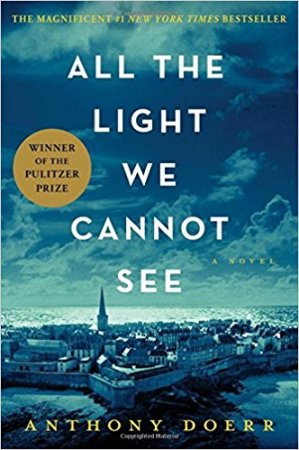 All the Light We Cannot See
All the Light We Cannot See About Grace
About Grace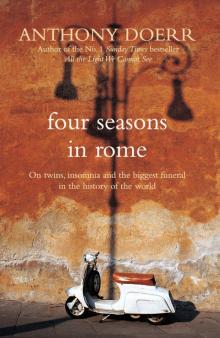 Four Seasons in Rome: On Twins, Insomnia, and the Biggest Funeral in the History of the World
Four Seasons in Rome: On Twins, Insomnia, and the Biggest Funeral in the History of the World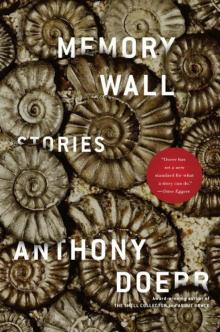 Memory Wall
Memory Wall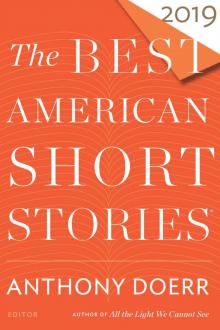 The Best American Short Stories 2019
The Best American Short Stories 2019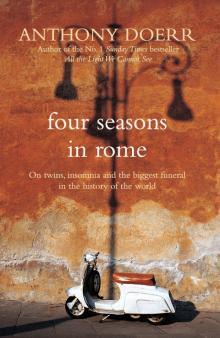 Four Seasons in Rome
Four Seasons in Rome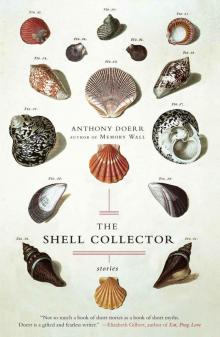 The Shell Collector
The Shell Collector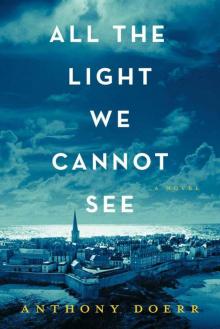 All the Light We Cannot See: A Novel
All the Light We Cannot See: A Novel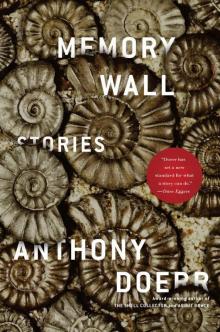 Memory Wall: Stories
Memory Wall: Stories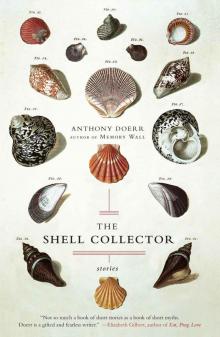 Shell Collector
Shell Collector